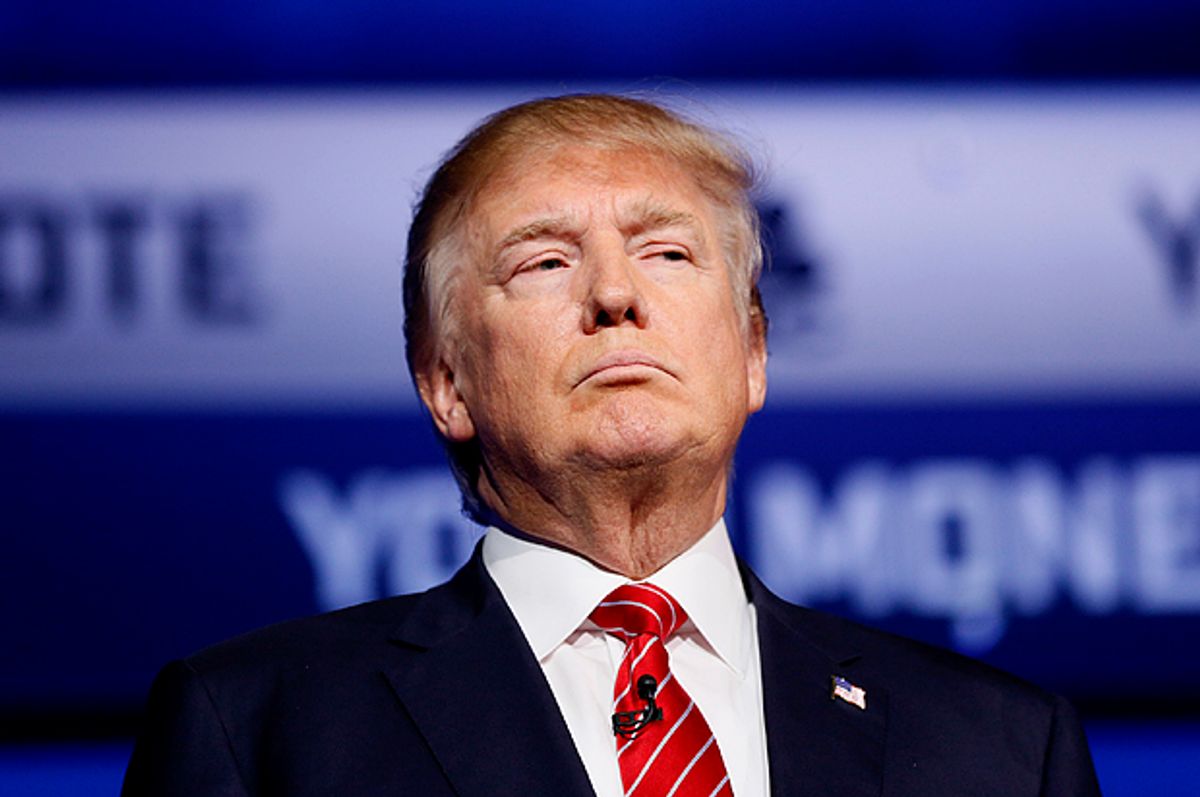One of the sharpest pieces of media criticism in the past couple of years has come from Slate's "If It Happened There" series, which imagines how the American media would cover American news in the same way that it covers news from other countries. The thing that the series gets above all is the gap between the on-the-one-hand caution American outlets take when covering domestic issues and the often sweeping, highly opinionated language they use when describing events elsewhere.
(Read the opening paragraph of this Washington Post story about elections in Argentina, for instance, and ask yourself if the Post would ever write about American elections that way.)
I've found myself thinking repeatedly about this disparity over the past couple of days, as the anti-Muslim climate in the United States has reached new heights and as Donald Trump has begun conducting what even some conservatives describe as a fascist campaign. How, I wonder, would the American media cover some other country—in South America, say, or the Middle East—where leading presidential candidates explicitly stirred up hatred against an already-demonized minority group and cheered on the beating of protesters at their events; or where armed gangs patrolled outside faith centers and leading businesses sanctioned religious discrimination?
The question answers itself, really. We'd be reading story after story about the terrifying authoritarian climate tearing through Country X—all with the implied assertion that We Don't Do That Sort Of Thing Here, Thank God.
Well, we certainly do that sort of thing here. Far too often, though, some of our top media outlets are either soft-peddling what's happening in the presidential campaign and in the country at large, or diving right into the cesspool along with the Trumps of the world. (More on that later.)
When Trump retweeted made-up, racist crime statistics from a neo-Nazi, some outlets initially called his actions "controversial" or "questionable," as though there was some debate about the odiousness of what he'd done. A New York Times story described his calls to surveil and register Muslims as "emphatic, if controversial." A Monday report on CBS dutifully showed tape of Trump and Ben Carson demanding more tracking of Muslims, then tape of President Obama and Jeb Bush objecting, then summed it all up by showing a poll that said a majority of Americans don't think Obama has a clear plan to fight ISIS. And that was that.
Can that not be that, please? The mainstream political media has such a pathological dedication to the notion of balance and "objectivity" that it often finds itself at a complete loss when it comes to dealing with someone like Trump. But the kind of filth that he and others are putting out has long since moved past the debatable stage. There is an Islamophobic crisis building in this country. To oppose discrimination against Muslims is not to take some partisan stand. It's to be a human being. To oppose a prominent political figure's use of fascistic slander toward black people is not to shirk your objectivity. It's the least the elite media should be doing.
There were some signs that the tide was turning a tiny bit as Monday went along. In NBC's political tip sheet, for instance, Chuck Todd and two other colleagues called Trump the "post-truth" candidate and said that it was "hard to disagree with the assessment of our colleague Benjy Sarlin: 'Let's not sugarcoat what's going on. The GOP frontrunner is spreading hateful falsehoods about blacks and Muslims.'" The Washington Post gave prominent space to fact-checker Glenn Kessler's debunking of Trump's demonstrably false claim that he saw Muslims cheering the 9/11 attacks in New Jersey.
That's just a start, though. The fact-checking should be in every single article about Trump, not a separate feature—and it's easy to dispute such obvious lies. As for Chuck Todd: Good job calling a spade a spade, but what is he going to do about it? Will he be tougher on Trump than he was on Ben Carson, whose open Islamophobia he let slide? Will he acknowledge, in every single report he does about Trump, that Trump is leading an objectively racist and authoritarian campaign? Will other reporters? To the Times' credit, it ran a story about a Muslim community in Michigan dealing with what the paper called "a tide of anti-refugee, anti-Muslim sentiment [that] has swept, angrily and inexorably, across the United States." There need to be far more stories like that.
And there need to be far fewer incidents like the ones that keep occurring at CNN lately. The network, which already disgraced itself with a shockingly Islamophobic interview about the Paris attacks last week, took another plunge into the gutter on Monday, when anchor Carol Costello had this exchange with the mayor of a Muslim-majority town in Michigan:
COSTELLO: You govern a majority-Muslim-American city. Are you afraid?
KAREN MAJEWSKI: No, I'm not afraid. And actually, I'd like to make another correction. We have, as of our last election, which was a couple weeks ago, we elected a Muslim-majority council. Whether the demographics of the city would say we're a Muslim majority city, I don't think that we're there yet. I think we're probably somewhere in the 40 percent Muslim for the city overall. But our city council that will take office in January will be a majority-Muslim council.
COSTELLO: So does that concern some of your citizens?
Costello also described what Donald Trump is saying about Muslims as "tough talk." She should be ashamed of herself, and CNN should think about how it can stop some of its anchors from helping such bigotry get mainstreamed.

Shares